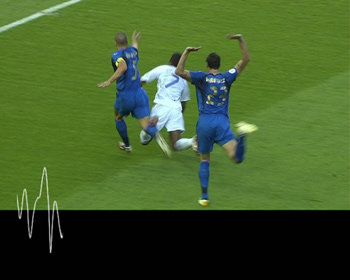Re-enactements
dal 21/2/2008 al 24/5/2008
Segnalato da
Nancy Davenport
Stan Douglas
Harun Farocki
Ann Lislegaard
Paul Pfeiffer
Kerry Tribe
John Zeppetelli
21/2/2008
Re-enactements
DHC/ART Foundation for Contemporary Art, Montreal
Culture in its myriad forms is available to artists as a repository or an archive to be plundered, contested, evoked and edited. Much contemporary art appropriates, re-imagines or otherwise re-visits established cultural texts, including popular culture and the history of art, film, and performance. The aim is to generate new meanings and fresh relevance from this source material, often by reiterating its value in the form of homage or deflating its claims in the form of critique, but always by rerouting it to mysterious and unexpected places.

Curated by John Zeppetelli
Nancy Davenport, Stan Douglas, Harun Farocki, Ann Lislegaard, Paul Pfeiffer, Kerry Tribe
Culture in its myriad forms is available to artists as a repository or an archive to be plundered, contested, evoked and edited. Much contemporary art appropriates, re-imagines or otherwise re-visits established cultural texts, including popular culture and the history of art, film, and performance. The aim is to generate new meanings and fresh relevance from this source material, often by reiterating its value in the form of homage or deflating its claims in the form of critique, but always by rerouting it to mysterious and unexpected places.
Popular re-enactments usually take the form of live reconstructions of military events performed by enthusiasts. In the art world, we have seen a number of performance-centred reconstructions of important live art events from the 60’s and 70’s, perhaps most compellingly staged by Marina Abramovic with SEVEN EASY PIECES (2005) in the Guggenheim’s rotunda. On a more overtly political front, Jeremy Deller’s THE BATTLE OF ORGREAVE (2001) re-staged a notorious episode in UK labour history, which pitted picketing miners with Thatcherite police in a complex historical re-enactment filmed by director Mike Figgis.
To re-enact is to repeat, re-author, and recycle all at once. It is a belief in the fallacy of absolute originality, with the attendant complications of authorship and intellectual property, and a concession to the “anxiety of influence”. To critically re-enact, as all the artists in this exhibition do, is to breathe new life into a cultural text in an attempt to offer a renewed aesthetic and political experience. These gestures are related and traceable to the traditions of collage, photomontage, the found object, and the ready-made, including found-footage and sampled visual narratives or “time ready-mades”.
Re-enactments consists of a series of “re-animations” prompted by diverse films or television spectacles. They are manifestations of a sifting and working through of their inspirational cultural artefacts. They acknowledge the inheritance and indebtedness to them, while pointing to media as a source for collective memory. This exhibition also makes visible the difficulty in untangling one’s personal thoughts from the large and complex weave of interrelated culture texts, discourses and memories.
Six artists present works that in some way critically re-stage films, media spectacles, popular culture and, in one case, private moments of daily life. Some of the works offer bold objectifications of our image-saturated world, while others trigger poetic confusion between memory, fact, and fiction. By vividly and imaginatively addressing politics, spectacle, and subjectivity, these re-workings of cultural products or events of the past pose compelling questions about the present.
Jean-Luc Godard is the inspiration for two works in the exhibition: Kerry Tribe uses Godard’s television masterpiece FRANCE/TOUR/DÉTOUR/DEUX/ENFANTS, made with Anne-Marie Miéville, as the starting point for her dual-screen installation Here and Elsewhere, whereas the acclaimed tracking shot in his film WEEK-END is the basis for Nancy Davenport’s WEEKEND CAMPUS.
Davenport also references two early moments of film history by the Lumière brothers and Georges Méliès in WORKERS (LEAVING THE FACTORY) – a speculative, multi-screen take on labour and globalisation. Stan Douglas’ two projector, single-screen film installation INCONSOLABLE MEMORIES uses the Cuban film classic MEMORIES OF UNDERDEVELOPMENT as its foundational text. These works are clearly not remakes in the Hollywood tradition, but critical studies which selectively deploy attributes or structural characteristics of the originals for wildly divergent ends.
Notorious televised sports and entertainment spectacles inform the three projects on view by Harun Farocki and Paul Pfeiffer. Farocki’s DEEP PLAY subjects the 2006 World Cup Final to a stunning formal, scientific, and statistical vivisection over twelve synchronised, real-time video projections. Michael Jackson is the subject of two Paul Pfeiffer works: LIVE EVIL (BUCHAREST), a quasi-mirrored image of Michael Jackson in performance, and LIVE FROM NEVERLAND, an installation concerning the pop star’s child molestation trial.
While not directly inspired by a film or television text, Ann Lislegaard’s I-YOU-LATER-THERE nonetheless strongly evokes the cinematic experience. The re-enactment in this work is of an inner life projected abstractly onto a rectangular surface made of floorboards, which becomes a stage or screen.
Like much media art, all the works on display are loops locked in a prison of endless replay. This aspect of repetition, and the ability to enter the work at any time, does not privilege a linear cathartic narrative. We are confronted instead with fragile, open-ended works, which structurally posit the inescapable cycle of deferral and inconclusiveness as a theoretical model through which to view both the many issues addressed in the works and the many experiences of the world.
Image: Harun Farocki, Deep Play (2007)
DHC/ART Foundation for Contemporary Art
451 St-Jean Street in Old Montreal
Opening Hours:
Wednesday to Friday from 12 PM – 7 PM; Saturday and Sunday from 11 AM – 6 PM



